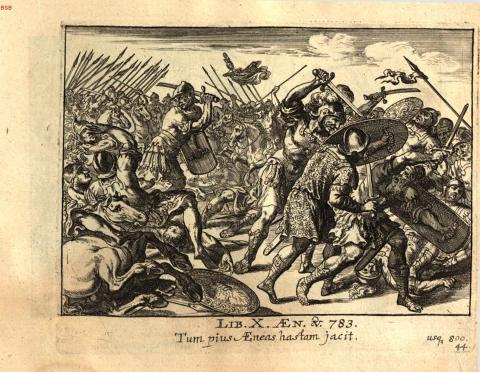Huic contrā Aenēās speculātus in agmine longō
obvius īre parat. Manet imperterritus ille770
hostem māgnanimum opperiēns, et mōle suā stat;
atque oculīs spatium ēmēnsus quantum satis hastae:
'Dextra mihī deus et tēlum, quod missile lībrō,
nunc adsint! voveō praedōnis corpore raptīs
indūtum spoliīs ipsum tē, Lause, tropaeum775
Aenēae.' Dīxit, strīdentemque ēminus hastam
iēcit. at illa volāns clipeō est excussa proculque
ēgregium Antōrēn latus inter et īlia fīgit,
Herculis Antōrēn comitem, quī missus ab Argīs
haeserat Euandrō atque Italā cōnsēderat urbe.780
Sternitur īnfēlīx aliēnō vulnere, caelumque
aspicit et dulcīs moriēns reminīscitur Argōs.
Tum pius Aenēās hastam iacit; illa per orbem
aere cavum triplicī, per līnea terga tribusque
trānsiit intextum taurīs opus, īmaque sēdit785
inguine, sed vīrīs haud pertulit. Ōcius ēnsem
Aenēās vīsō Tyrrhēnī sanguine laetus
ēripit ā fēmine et trepidantī fervidus īnstat.
Ingemuit cārī graviter genitōris amōre,
ut vīdit, Lausus, lacrimaeque per ōra volūtae—790
vocabulary
contrā: (prep. and adv.; prep. w. acc.), over against; opposite to, 1.13; against, 5.370; to, 9.280; on the contrary, 12.779; on the other hand, in reply, 1.76.
Aenēās, ae, m.: 1. A Trojan chief, son of Venus and Anchises, and hero of the Aeneid, 1.92. 2. Aenēās Silvius, one of the Alban kings, 6.769.
speculor, ātus sum, 1, dep. a. and n.: to look out, mark, survey, behold, espy, 7.477; watch, consider, observe, 1.516. (specula)
obvius, a, um: adj. (ob and via), in the way; presenting one's self or itself; meeting, 1.314; against, 6.880; opposing, 9.56; in the way of; exposed to, 3.499; obvius fierī, to encounter, meet, 10.380.
imperterritus, a, um: (adj.), undaunted, 10.770.
māgnanimus, a, um: adj. (māgnus and animus), possessing a great soul; noble-minded; great, generous, noble, 5.17; brave, 10.139; mighty, 12.144; of animals, high-spirited, highbred, 3.704.
opperior, perītus or pertus sum, 4, dep. a. and n.: to wait for, await, 1.454.
mōlēs, is, f.: a cumbrous mass; a heavy pile or fabric; mound, rampart, 9.35; dike, 2.497; a mass of buildings, vast buildings, 1.421; structure, 11.130; frame or figure, 2.32; bulk, 5.118; weight, 7.589; pile, mass, 1.61; gigantic frame, 5.431; warlike engine, siege tower, 5.439; array, pomp, train, 12.161; body of soldiers, phalanx, 12.575; heavy storm, tempest, 5.790; toil, work, labor, 1.33.
ēmētior, mēnsus sum, 4, dep. a.: to measure out or off, 10.772; pass over, traverse, 5.628.
hasta, ae, f.: a spear, 2.50, and freq.; hasta pūra, a headless spear, 6.760; pampinea hasta, a thyrsus, 7.396.
missilis, e: adj. (mittō), that is sent or cast; missive, thrown, hurled, 10.421; subst., missilia, ium, n., missile weapons, darts, missiles, 10.802.
lībrō, āvī, ātus, 1, a.: to balance, poise; of weapons, to aim, 5.479; to dart, 9.417. (lībra, a balance)
adsum, adfuī, esse, irreg. n.: to be near or by; to be present, at hand, or here, 1.595; to have arrived, 2.132; to be with, attend, 2.701; aid, accompany, 10.547; be propitious, 3.116; to beset, 2.330; inf., adfore, to be about to come, destined to come, 7.270. (imp. subj., adforem, -ēs, -et, -ent)
voveō, vōvī, vōtus, 2, a.: to make a pledge or vow to a deity; vow, 10.774; consecrate, devote, 11.558.
praedō, ōnis, m.: a robber, 10.774. (cf. praedor, rob)
induō, uī, ūtus, 3, a.: to put into; put on, assume, 1.684; clothe; surround, crown, 3.526; pierce, slay, 10.682; (pass. as middle, w. acc.), gird one's self with, put on, 2.393; induere in vultūs, transform to the features, 7.20.
spolium, I, n.: that which is taken from the body of a slain man or beast; spoil, trophy, 1.289; spolia opīma, the arms or spoils taken by a victorious general from the body of a hostile commander slain in battle, 6.855.
Lausus, ī, m.: an Etruscan chief, son of Mezentius, 7.649, et al.
tropaeum, ī, n.: a memorial of the turning (cf. τρέπειν, to turn) or rout of an enemy; the trunk of a tree on which were hung the arms or spoils of an enemy slain; any memento of victory; a trophy.
strīdeō, 2, n., and strīdō, strīdī, 3: to produce a grating or shrill sound; to creak, 1.449; gurgle, 4.689; rustle, 1.397; whiz, roar, 1.102; hiss, 8.420; twang, 5.502.
ēminus: (adv.), from afar, at a distance, 10.346. (ē and manus)
volō, āvī, ātus, 1, n.: to fly, 1.300, et al.; of rumor, to be spread rapidly, noised or spread abroad, 3.121.
clipeus, ī, m., and clipeum, ī, n.: a round shield; a shield, 2.227, et al.
excutiō, cussī, cussus, 3, a.: to shake out or off, 2.224; throw or cast down, 1.115; cast out, 10.590; drive away, 3.200; expel, 7.299; shake out, uncoil, 3.267; uncoil and arrange (set the sails), 3.683; deprive of, 6.353; throw aside, break, 12.158; hurry forth, call forth, 9.68. (ex and quatiō)
Antōrēs, ae, m.: a Greek warrior, follower of Evander, 10.778.
īlia, ium, n. pl.: the groin, flank, 7.499; belly, 10.778.
fīgō, fīxī, fīxus, 3, a.: to fix or fasten; freq., the object in or on which, in the abl., 1.212; abl. w. prep., 6.636; acc. w. prep., 9.408; fasten up, suspend from, 3.287; hang up, 1.248; set up, establish, make, 6.622; transfix, pierce, 5.516; hurl (fix by hurling), 10.883; wound, 10.343; inscribe, 11.84.
Herculēs, is, m.: the god of strength and labor, son of Jupiter and Alcmena, 5.410, et al.
Argī, ōrum, m., and Argos, n.: Argos, the capital of Argolis, and a favorite abode of Juno, 1.24; Greece, 2.95. (nom. and acc.)
haereō, haesī, haesus, 2, n.: to stick; foll. by dat., or by abl. w. or without a prep.; hang, cling, adhere, cling to, 1.476, et al.; stop, stand fixed, 6.559; halt, 11.699; adhere to as companion, 10.780; stick to in the chase, 12.754; persist, 2.654; dwell, 4.4; pause, hesitate, 3.597; be fixed or decreed, 4.614.
Euander (-drus, 8.100; Ēvander, -drus), drī, m.: Evander, an Arcadian prince, son of Carmentis, and king of Pallanteum on the Tiber, 8.52.
Italus, a, um: Italian, 3.440, et al.; subst., Italī, ōrum, m., the Italians, 1.109. (Ītalia)
cōnsīdō, sēdī, sessus, 3, n.: to sit or settle down together or completely; sink, 2.624; sit, 4.573; sit in mourning, 11.350; take a seat, 5.136; alight, 3.245; settle, 10.780; dwell, 1.572; abide, rest, 11.915; to lie at anchor, to anchor, 3.378; to be moored, stationed, 7.431.
sternō, strāvī, strātus, 3, a.: to spread out, spread, 1.700; stretch on the ground, strike down, slay, 1.190; cast down, prostrate, devastate, 2.306; make level, smooth, calm, 5.763; spread, cover, 8.719; strew, litter; overthrow, conquer, 6.858; pass. (in middle sense), sternor, ī, to stretch one's self, lie down, 3.509.
īnfēlīx, īcis: (adj.), unlucky; unfortunate, luckless, unhappy, 1.475, et al.; sad, miserable, 2.772; of ill omen, ill-starred, ill-boding, fatal, 2.245; unfruitful.
reminīscor, 3, dep. n. and a.: to call to mind; recall, remember, think of, 10.782. (re- and rt. men, cf. memini)
cavus, a, um: (adj.), hollow, 1.81; concave, 8.599; arching, vaulted, 2.487; cavae manūs, the palms of the hands, 12.86.
triplex, icis: adj. (trēs and plicō), threefold, triple, 10.784, et al.
līneus, a, um: adj. (līnum), flaxen, 5.510.
trānseō, iī, itus, īre, irreg. n. and a.: to go across; go through, pass, 12.926; pass by, 5.326; pass away, 1.266; run over, 5.274; pass through, 9.413.
intexō, uī, tus, 3, a.: to weave into or in; work in, inweave, 5.252; festoon, wreathe, entwine; cover, 6.216; frame, 2.16.
taurus, ī, m.: a bull, steer, ox, bullock, 2.202, et al.
inguen, inguinis, n.: the groin, 10.589.
perferō, tulī, lātus, ferre, irreg. a.: to carry or bear through; carry, restore, return, 11.717; report, 5.665; convey completely, carry home, 10.786; reach the mark, 12.907; undergo, endure, suffer, 3.323; (w. reflex. pron.), betake one's self, go, 1.389; p., perlātus, a, um, carried to the mark; striking, 11.803.
ōcior, ius: adj. comp. (superl., ōcissimus, a, um), swifter, more fleet, 5.319, et al.; (adv.), ōcius, more swiftly; rapidly, speedily, quickly, swiftly, 12.681.
ēnsis, is, m.: a sword, 2.393, et al.; knife, 2.155.
Tyrrhēnus, a, um: adj. (Tyrrhēnī), Tyrrhenian; Etruscan, Tuscan, 1.67; subst., Tyrrhēnus, ī, m., a Tuscan, 10.787.
laetus, a, um: (adj.), joyful, joyous, glad, 4.418, et freq.; delighting in (w. abl.), 1.275, 696; 2.417; springing, 10.643; sparkling, radiant, 1.591; happy, auspicious, 1.605; abounding, rich, full (w. abl. or gen.), 1.441; well fed, fat, 3.220; blissful, blessed, 6.744.
fēmineus, a, um: adj. (fēmina), pertaining to women; female, 9.142; a woman’s, of a woman, 2.584; of women, 4.667; fit for a woman, 12.53.
trepidō, āvī, ātus, 1, n. and a.: to be in trepidation, alarm or panic, 10.788; to hurry, hasten to and fro or about, 2.685; to hasten (with inf.), 9.114; to strive nervously, make trembling effort, 12.403. (trepidus)
fervidus, a, um: adj. (ferveō), glowing hot; glowing; fired, 9.736; furious, 7.397; boiling, 7.24; threatening, 12.894; eager, impetuous, 12.748.
īnstō, stitī, 1, n.: to stand on or upon; w. dat., acc., inf., or alone; w. dat., to stand on, 11.529; stand or hang over, 10.196; (w. acc.), to work at, ply work upon, 8.834; (w. inf.), urge on, press on, 1.423; persist, 10.118; (alone), to follow up, press on; pursue, 1.468; struggle, 12.783; be near at hand, approach, threaten, 12.916; to be urgent, important, incumbent, 4.115.
ingemō, uī, itus, 3, n. and a.: to sigh or groan, 1.93; (w. acc.), groan for; lament, bewail.
graviter: (adv.), heavily; deadly, 7.753; greatly, deeply, 1.126; heavily, mournfully, 2.288. (gravis)
genitor, ōris, m.: he who begets; father, sire, 1.155, et al. (gignō)
volvō, volvī, volūtus, 3, a.: to roll, 1.86; roll along or down, 1.101; roll or cast up, 3.206; toss, hurl, 12.906; roll over, roll in the dust, 12.329; cast, hurl down, 1.116; 9.512; roll, wheel, 1.163; of books, open, unroll, 1.262; of the Fates, fix the circle of events, decree, ordain, dispose, 1.22; 3.376; of the mind, revolve, meditate, reflect upon, 1.305; pass, continue, live through, experience, endure, suffer, 1.9; rotam volvere, to complete a cycle, period; (pass.), volvī, roll over, roll, 10.590; turn or wind about, 7.350; to be shed, to flow, 4.449; roll on, revolve, 1.269.


